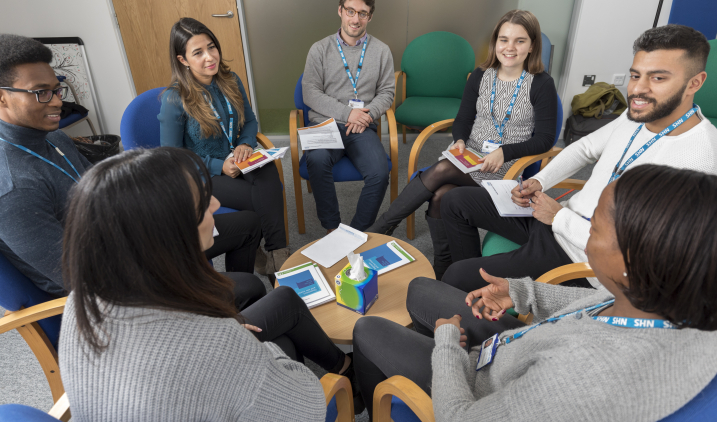Clinical associate in psychology
Clinical associates in psychology provide psychological interventions under the supervision of a fully qualified practitioner psychologist.
You’ll support people who have longstanding and complex problems, using psychological theory and evidence to find the best interventions to meet their needs. You will also be involved in service evaluation or research. It's a new role and is closely aligned with clinical psychologists.

Life as a clinical associate in psychology
By creating a psychological formulation – a simplified 'map' of how different aspects of a person's problem fit together and what could be keeping it going – you develop a picture of their difficulties. You'll then provide effective and evidence-based psychological interventions that are most appropriate to their needs.
You’ll work autonomously but with the support and under the supervision of a practitioner psychologist. Supervision will help you to engage in self-reflection, seek and respond to feedback and develop your professional knowledge and skills.
You will work with specific populations. For example, you might work in children and young people’s services or adult mental health services, depending on the area you have trained in.
You are likely to work in one or several of the following:
- community mental health teams
- hospitals or inpatient settings
- secure or medium-secure mental health settings
- specialist mental health services
You’ll be part of a multidisciplinary team with professionals from different backgrounds, such as clinical/counselling psychologists, psychological therapists, community mental health nurses, psychological wellbeing practitioners, social workers, occupational therapists, psychiatrists, support workers, employment specialists and peer support workers.
How much can I earn?
Terms and conditions can vary if you are employed outside the NHS.
How about the benefits?
- be part of an exciting new role to help people with complex and longstanding mental health problems
- make a difference
- work flexible and part-time hours
If you’re employed by the NHS, you’ll also have good holiday entitlement and access to:
- fully funded training plus a salary while you train
- an excellent pension scheme
- NHS discounts in shops and restaurants
Must-have skills
- a keen awareness of people and their behaviour
- a capacity for study and continued learning
- excellent interpersonal skills and the ability to build trusting and productive relationships with a wide range of people in a variety of situations
- strong written and verbal communication skills tailored to a variety of audiences
- the ability to work on your own as well as in consultation with others
- a responsible, professional approach, respecting the confidentiality of patients
- emotional resilience and maturity
You'll also need to be able to demonstrate the values of the NHS Constitution.
Entry requirements
The apprenticeship includes elements of theory, research and practical skills and will qualify you to work as a practitioner in NHS services.
How to become a clinical associate in psychology
To apply, you’ll need either:
- an accredited degree in psychology recognised by the British Psychological Society (BPS) which enables eligibility for Graduate Basis for Chartered Membership or
- to have completed a BPS-accredited postgraduate psychology conversion course
You will also need experience (paid or voluntary) of working in health, mental health and/or psychological service settings.
Where a career as a clinical associate in psychology can take you
It’s important to note that a two-year psychological professions funding rule policy was implemented on 1 April 2022. This means that if you start NHS-funded psychological professions training from April 2022, you won’t be eligible for NHS funding for further psychological profession training for two years from the expected completion date of your first training, where it would lead to a change in your job role.